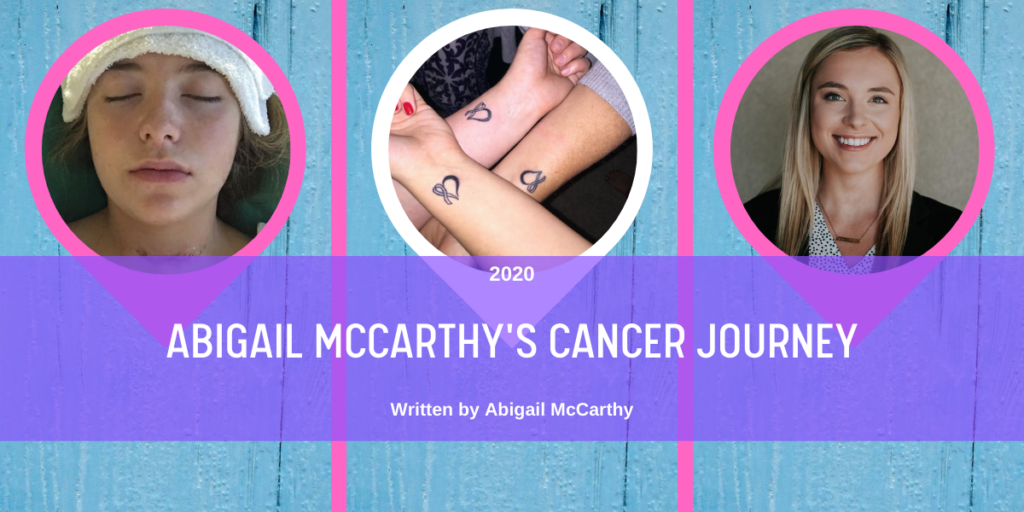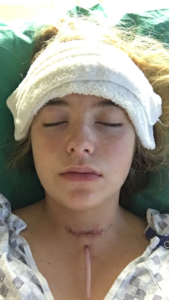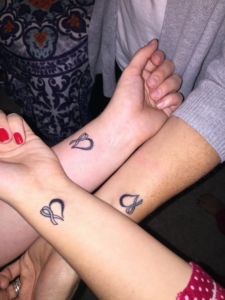Abigail McCarthy’s Cancer Journey

By: Abigail McCarthy
My name is Abigail McCarthy. I am a senior at The University of Iowa College of Public Health. I am from Sioux City, Iowa, and am 21 years old. Currently, I am an intern at the Iowa Cancer Consortium and am loving every minute of it. In this blog post, I will discuss my own cancer journey.
Early Signs of a Problem
Starting around the age of 13, there were many indications and red flags that something was not right with my health. I started taking anxiety medicine because I had so many anxiety attacks, panic attacks and fainting spells. I was as tired as a newborn baby and slept constantly. I received many detentions for sleeping in class, and my teacher joked that I had narcolepsy. Another teacher pulled me aside and told me I should see a doctor. I would come home from school and go straight to bed. My parents and others suggested that I may be depressed because I was showing depressive signs and behaviors – sleeping too much, lethargic, gaining weight, and mood swings. So I started anti-depressants in addition to the anxiety medication.
For as long as I can remember, I have always struggled with my weight. I did every sport out there, did CrossFit, ate healthy for the most part, and yet I continued to gain weight. I went to see a doctor around the age of 14 because of how irregular my periods were, my abnormal weight gain, my acne, and my moods. My doctor immediately said, “You need to go on birth control.” Period. She didn’t outline the risks or side effects. I didn’t have any blood work or tests done. I felt like a toddler being told what to do instead of knowing what my options were.
Even with these medications, I still wasn’t feeling right – which friends, family, teachers, and coaches noticed. I went to numerous doctor’s appointments and they continued to leave me feeling hopeless. One doctor thought I was pregnant; nope. Another drew my blood, but it only showed that I had low potassium levels. And then finally, one doctor gave me a diagnosis.
According to the American Cancer Society, signs and symptoms of thyroid cancer include:
- A lump in the neck, sometimes growing quickly
- Swelling in the neck
- Pain in the front of the neck, sometimes going up to the ears
- Hoarseness or other voice changes that do not go away
- Trouble swallowing
- Trouble breathing
- A constant cough that is not due to a cold
Thyroid cancer is most often diagnosed when a lump was found. Despite all of my symptoms, my neck hadn’t been checked at this point.
Diagnosis
During a routine physical two weeks before college, my neck was finally examined and they felt a lump. I was 18 and diagnosed with papillary thyroid cancer. I felt like my whole world was crashing down just as I was beginning my new adventure in life.
When first diagnosed, I had no idea what a thyroid was. After a ton of research, I realized I checked all of the boxes. How had this not been seen? To this day, I still wonder what caused my cancer and why it occurred so early in my life. I pursued the public health field for this reason.
My doctor told me the tumor had been growing for a long time. The course of surgery changed to a complete thyroidectomy because it was large and still growing.
Treatment
 About three weeks after surgery, I was informed that the cancer was in my lymph nodes. I then received radioactive iodine and isolated myself. I was told, “This is the type of cancer to have.” So, my young, ambitious self-thought I could handle my first year of college and cancer at the same time; big mistake.
About three weeks after surgery, I was informed that the cancer was in my lymph nodes. I then received radioactive iodine and isolated myself. I was told, “This is the type of cancer to have.” So, my young, ambitious self-thought I could handle my first year of college and cancer at the same time; big mistake.
Since the radioactive iodine treatment, I have had six surgeries to address the damage it caused to my body. The iodine treatment caused the ducts to my parotid and submandibular salivary glands to close, as well as the tear ducts to my eyes. Every time I ate my cheeks would swell, causing severe pain. With tear ducts closed, tears consistently ran down my face. After many attempts to fix the ducts with stents, probing, and balloon dilation my right salivary gland has completely atrophied. My sense of taste is off, I am not producing a sufficient amount of saliva, and in turn, my dry mouth is a threat to the health of my teeth.
Recovery
It took my body a very long time to adjust without a thyroid. I could not stay awake and had zero energy to do anything. This affected my grades, social life, and college experience overall. Student Disability Services at the University assisted me during this time and prompted me to have a personal conversation about my situation with each of my professors. Accommodations like sitting in a specific spot so I could see the board without straining my neck was crucial.
Managing school during all of this was not probable. Luckily, I had a family friend with a house in Iowa City that my mom and I stayed at for four weeks while I recovered from my first surgery. I continued with my classes during this time; I never regretted something more. The radioactive iodine treatment calls for complete isolation for three weeks, so we waited for Thanksgiving break to receive the treatment. It felt like my family and I had just reached the peak of the mountain and gained some type of hope. Then my dad was diagnosed with prostate cancer and we were pushed right back to the bottom of the mountain. This made returning to school very difficult.
After Cancer
Dr. Tara Henderson, the director of the UChicago Medicine Childhood Cancer Survivors Center says, “We know that for children who receive cancer treatments, any developing organ can be impacted by chemotherapy and radiation. That puts them at risk for developing heart failure and lung disease, along with secondary cancer, and this study really showed how pervasive those problems are.” (Ayshford, 2019).
Even when treatments performed on pediatric and other cancer patients are effective in ridding the body of cancer, there can be lasting effects on the patient’s quality of life.
Your thyroid controls your body’s metabolism. When I finally lost 40 pounds, I was relieved and overjoyed. Unfortunately, my thyroid also altered my digestive system and ultimately my diet. Even after trying multiple different dosages, my body was not accepting my thyroid replacement medication. My levels were not normal and I still felt awful. However, my doctor wanted to wait and check them again in a month. I then took it into my own hands to find help and went to a functional medicine clinic*. They ran blood tests and discovered a lot of allergens. I am now gluten-free, lactose-free, and do not eat red meat. My levels finally stabilized with the proper level of Synthroid. I have never felt better in my entire life.
*Functional medicine is also known as lifestyle medicine. According to the American Cancer Society, “Lifestyle medicine is a newer field that describes its approach as preventing and treating illness through healthy eating, physical activity, and other healthy behaviors without the use of medicine.” When used as a complement to standard treatment, lifestlye medicine has improved quality of life in some cases.ACS also cautions cancer patients who are “thinking about using any method instead of standard evidence-based medical treatment, it is important to talk to your health care team first.” Learn more about alternative medical treatments.
In Retrospect
Looking back, I wish the following were handled differently:
- Doctors and adults should have taken me seriously, rather than assuming I was seeking attention.
- Someone should have educated me on what a thyroid does and warned me of the possible effects of not having a thyroid.
- I wish health care professionals individualized their care to their patients, and not just followed protocol – everyone’s body is different.
- Health care professionals should focus on finding the root cause of health issues instead of trying to cover them up with medications like birth control.
I encourage all patients to be involved in their course of care. If it isn’t working, keep asking questions and be your own advocate. No one knows your body or how you are feeling better than you do. Above all else, do not get discouraged or give up. I felt awful for so long but have made great progress and did not settle for feeling okay.
 I never would have been able to get through any of this if it weren’t for my parents, my three siblings, and my friends. In addition to all the help and support, my mom and sister got a tattoo with me to symbolize strength, support, and love throughout all the bad that cancer brought to our family. I constantly have a reminder on my wrist of how strong I am and that if I can get through cancer, I can get through anything.
I never would have been able to get through any of this if it weren’t for my parents, my three siblings, and my friends. In addition to all the help and support, my mom and sister got a tattoo with me to symbolize strength, support, and love throughout all the bad that cancer brought to our family. I constantly have a reminder on my wrist of how strong I am and that if I can get through cancer, I can get through anything.
Ayshford, Emily. “Understanding Risks for Childhood Cancer Survivors.” UChicago Medicine, UChicago Medicine, 12 Sept. 2019, www.uchicagomedicine.org/forefront/cancer-articles/understanding-risks-for-childhood-cancer-survivors.
